Russian propaganda’s neo-Nazi myth
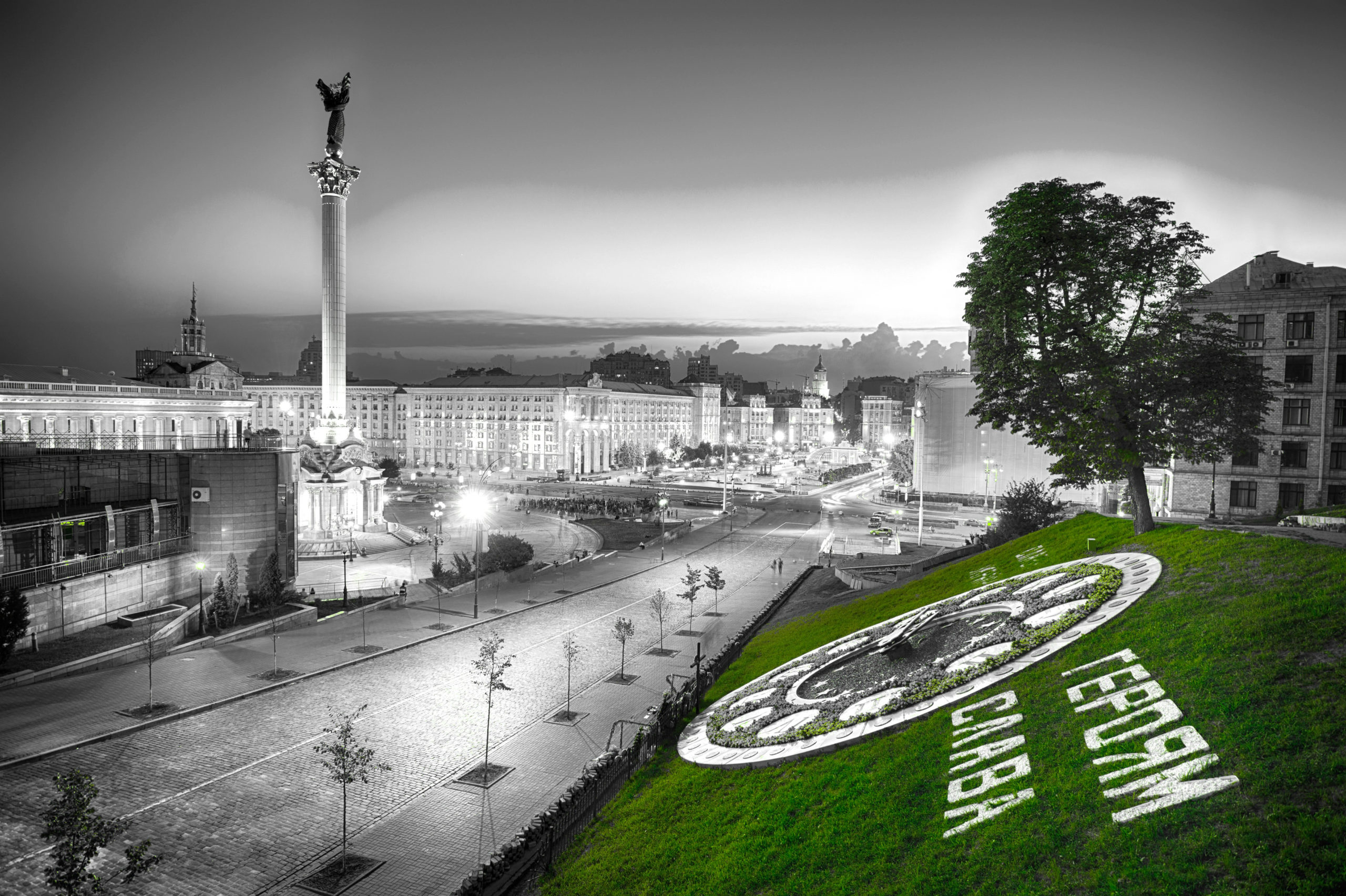
Denazification of Ukraine was proclaimed as one of the motivations for the full-scale invasion launched by the Russian Federation on 24 February 2022. It means that the Russian government considered, at least in its public statements, that Nazi sentiments among Ukrainians were a legible threat that could justify starting a war on the territory of a sovereign foreign state.
These accusations of Nazism, while being ludicrous, are also dangerous because they twist the facts in their attempts to portray the victims of genocide as villains. The information war employed by Russia has aimed to sow doubt in the international community by replacing the historical facts. This is almost as dangerous as the battles on the front lines, since those doubts can compromise international support for Ukraine, which it needs to win the war. Therefore, it is absolutely crucial to set the record straight regarding the baselessness of these accusations.
In order to discredit the propaganda allegations of Nazism, I will focus on three key periods in Russia’s attempts to create a false picture about Ukraine: the struggle for independence and search for national heroes during and after WWII; the decay of Soviet identity after independence and until the Revolution of Dignity in 2014; and the rebirth of Ukrainocentric identity in opposition to Russia after its aggression against Ukraine began in 2014, culminating in its full-scale invasion in 2022.
20th-century Ukrainian liberation movement: National heroes and anti-heroes
The main “bogeyman” of Russian propaganda—Stepan Bandera—remains one of the most disputed yet important figures in modern Ukrainian history. Before the outbreak of WWII he was a leader of the Ukrainian liberation movement (represented by the Organization of Ukrainian Nationalists, OUN). One of the main aims of the movement was to achieve Ukrainian independence from the Soviet Union. Without a doubt, the personality of Stepan Bandera is complex, which makes him an easy target for Russian propaganda.
Ukrainian history of the 20th century has many names that were erased or vilified by Soviet propaganda due to their attempts to reinstate Ukrainian independence—a sentiment that was actually shared in many countries of Central and Eastern Europe. Therefore, declaring Ukrainian patriots to be Nazis by default for resisting Soviet occupation is unjustifiable and twists the historical facts. However, Russian propaganda continues the tradition of the Soviets by claiming that any Ukrainian who believes it is necessary to fight for the independence of their homeland is a war criminal.
It should also be noted that historically, Ukrainians played a crucial role in the defeat of the Nazis during WWII. The front crossed the territory of Ukraine twice, causing from 5 to 7 million deaths and destroying hundreds of cities. Those wounds lie deep within the memory of Ukrainians, and seeing similar pictures of their land levelled by Russian troops today bears a deep and tragic symbolism for Ukrainians.
Breaking with the Soviet past and looking for national identity
After gaining independence in 1991 in the wake of the collapse of the USSR Ukraine had to recollect its self-identity piece by piece following seventy years of Soviet censorship, find its national heroes that were erased from history, and revive the Ukrainian language that had been excluded from everyday life. Considering that its struggle for independence from Russia has been an integral part of Ukrainian history for centuries, the Russian regime has always seen it as a threat to its security—and reviving Ukrainian history means losing its allegiance and dependence on Russia. Three factors are among the most critical influences in Ukraine’s struggle to define its identity: language, decommunization, and political elites. Not surprisingly, they all have been targets for Russian propaganda, which has longstanding experience in whitewashing black deeds and distorting the truth.
Language
According to the 2001 Ukrainian census, almost one-third of Ukrainian citizens declared Russian to be their mother tongue. Such a high number of Russian speakers was used by Russian propaganda as a justification for “protecting” their own people. However, although language is an important factor for self-identity, it does not define the national identity of a person—which is confirmed by Ukrainian polls. According to a 2019 poll, an overwhelming majority of the population of Ukraine considered themselves as primarily Ukrainians (75%). Moreover, according to a study of Ukrainian citizens of Russian descent, one-third described themselves as Ukrainians, while another third of respondents identified themselves as “Russian-speaking citizens of Ukraine”; meanwhile, only 18% of Ukrainian citizens of Russian descent chose “Russian” to specify their identity.
The main political concern for both the Kremlin and most prior Ukrainian governments was to define the status of the Russian language in Ukraine. Since 1996, the Ukrainian Constitution proclaims that “the state language of Ukraine is the Ukrainian language.” However, there were many attempts to give special status to Russian. Most notably, in 2012 the pro-Russian Party of Regions tabled a bill that allowed the use of Russian as a minority language in courts, government institutions, and schools. Nevertheless, in 2018 the Constitutional Court of Ukraine ruled the law unconstitutional.
On the one hand, many states have multiple official languages, including Canada. However, there is one drastic difference that rules out comparing those cases: neither France nor any English-speaking state is threatening the sovereignty of Canada or considering its independence to be a mistake of history. In case of Ukraine or many other post-Soviet states, however, the Russian language is a Trojan horse that can be used against their state sovereignty at any point the Russian government decides to “protect” another group of “Russian-speakers.” Therefore, after the collapse of the USSR not many states granted the Russian language official status. Only Belarus proclaimed it to be a state language, while Kazakhstan, Kyrgyzstan, and Tajikistan accepted it to be an official (but not state) language.
On the other hand, most post-Soviet states chose to legally limit the official and cultural use of Russian after proclaiming their independence. In this respect, Ukraine was by far not the most radical example. Estonia, Latvia, and Lithuania, while having Russian-speaking minorities of almost the same proportions as Ukraine, were much more straightforward in ensuring that all official documentation, media, and education is delivered in the state language. In Georgia, another state that suffered the consequences of being in the sphere of “Russian interests,” education policies ensured that most youth do not speak Russian as a result of the.
Nowadays, after decades of tolerating Russian within their public and private lives many Ukrainians, even from Russian-speaking cities that are being shelled by Russian missiles, are choosing to speak Ukrainian instead of Russian in order to distinguish themselves from the invaders. Russian propaganda is entirely to blame for turning the tool for promoting its culture into a threat of being “liberated” by the Russian Army.
Decommunization
The legacies of their Communist past strike many painful chords for Ukrainians. They suffered from multiple attempts of the Communist Party to target them in orchestrated disasters, the deadliest of which—the Holodomor—killed millions of Ukrainians in just a few years. Thus, blaming Ukraine for trying to get rid of the street names and monuments of people involved in that process seems hypocritical.
The process of decommunization in Ukraine got kickstarted rather late—after the Revolution of Dignity in 2014—even though some steps forward were also made before that. In 2015 the Ukrainian parliament passed decommunization laws banning the symbols of totalitarian regimes as well as public denial of their crimes. What is important is that this law equated Nazi and Communist symbols, which the Kremlin then claimed “limited the fulfilment of freedom of speech, conscience, and beliefs.” For the Russian regime, Soviet nostalgia is a tool for justifying the unity and the common past of the Ukrainian and Russian peoples. As a result, they were aggravated by Ukraine’s attempts to remove the painful reminders of its Soviet past from city squares and history books.
Today the Ukrainian public is showing high and growing support of the decommunization process. In 2016 48% of Ukrainians supported the laws, while 36% declared they were against them. And according to the most recent poll, 87% of Ukrainians stated that they do not regret the collapse of the USSR.
Moreover, Ukraine is by no means the only post-Soviet state that officially denounced the Communist symbols. Estonia, Latvia, Lithuania, Georgia, Romania, and others have similar laws that equate Communist and Nazi symbols and prohibit them. For each of those states, including Ukraine, breaking the ties from their Communist past is a crucial step toward self-identity as a sovereign state.
Political elites
Since 2014 Russian propaganda has been claiming that Ukrainian politics were usurped by far-right nationalists. But those allegations are unfounded on Ukrainian political realities. The only political party with a nationalist ideology, Svoboda, was represented in only one convocation of the Verkhovna Rada of Ukraine (2012–14), with a mere 10% of the votes. Even after the Revolution of Dignity and the start of the Russo-Ukrainian War in the Donbas, representatives of parties with far-right ideologies have never been represented in the Ukrainian parliament.
Therefore, allegations of extremist elements in Ukrainian politics are wholly the product of Russian propaganda, which aims to discredit Ukraine before Western elites. It cannot go unnoticed that compared to other political elites in Europe—which show much higher support of openly far-right parties and politicians (after all, Marie Le Pen received 42% of the votes in recent French elections, while Alternative for Germany currently has 83 seats in the Bundestag)—Ukraine can hardly be blamed for any of its negligible ultranationalist sentiments.
Currently, there are no far-right parties represented in the Verkhovna Rada of Ukraine. On the other hand, the openly pro-Russian “Opposition Platform – For Life” party won 37 seats in the 2019 elections. This party was dissolved by the Ukrainian parliament in April 2022 due to its involvement with Russian propaganda and aggression. However, a few days later the MPs formerly from that party created a new parliamentary group called “Platform for Life and Peace.” Considering the threat to state security that pro-Russian parties bring to Ukrainian politics, their existence should be of much bigger concern than the ghost of far-right parties in Ukrainian political elites.
The War
The full-scale invasion by the Russian army in Ukraine that started on 24 February 2022 has undoubtedly changed the attitude of Ukrainians toward Russians for many generations to come. As a result, many Ukrainians have also revised how they see the historical personalities and organizations that fought for Ukrainian independence throughout the 20th century. For example, support for the OUN jumped to 80% of responders answering “Yes” or “Mostly yes” to the question “Do you support recognition of the OUN-UPA as participants in the struggle for the national independence of Ukraine?” It will undoubtedly be used by Russian propaganda as proof that most Ukrainian citizens are Nazis, and killing them can be justified. However, looking at the war crimes committed by the Russian army in Ukrainian cities reveals who the real criminals are.
Even one of the most well-known battalions of the Armed Forces of Ukraine—“Azov”—upon a closer look, has proved that its members are not neo-Nazis, as the Russian propaganda claims, but ordinary Ukrainians who believe that their country should be sovereign and independent from foreign intervention. Though the roots of the regiment can indeed be traced to nationalist ideology, after becoming a regular combat unit the Azov battalion broke with those ideological ties and is primarily associated with military prowess, including its heroic defence of Mariupol.
The shelling of residential areas, rapes, and targeted killings of civilians—all of these atrocities resemble the crimes of WWII far too well. Why do Russian soldiers think that those crimes can be justified? Because their propaganda has been dehumanizing Ukrainians for almost a decade, twisting the facts, and creating a story about neo-Nazis that seized political power and oppresses Russian-speaking Ukrainians. Ironically, those lies resulted in the complete unreadiness of Russian troops to face the reality in which every Ukrainian is ready to protect his or her land not because of ideology but because it is their homes, lives, and families that are being attacked.
Thus, it is crucial to be aware that the narrative of the popularity of ultranationalist sentiments in Ukraine is a part of Russian propaganda, which it uses to discourage foreign support of Ukraine and its citizens. Thus, the will of the Ukrainian population to defend its independence should not be mistaken for Nazi ideology, which Ukraine officially denounced together with Soviet Communism.
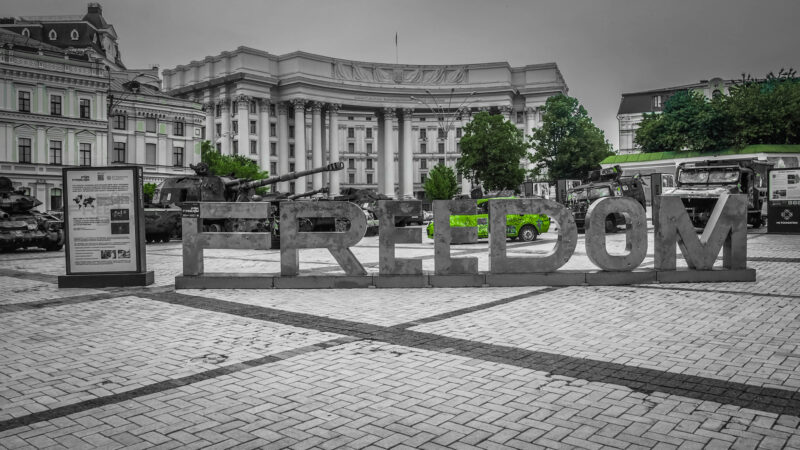
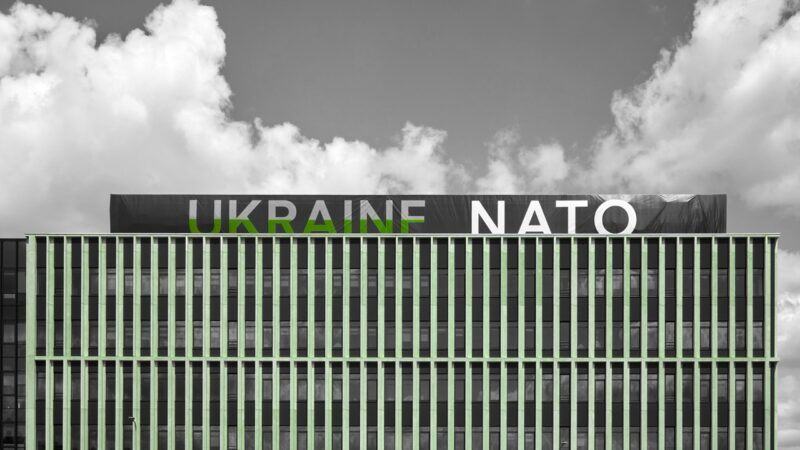
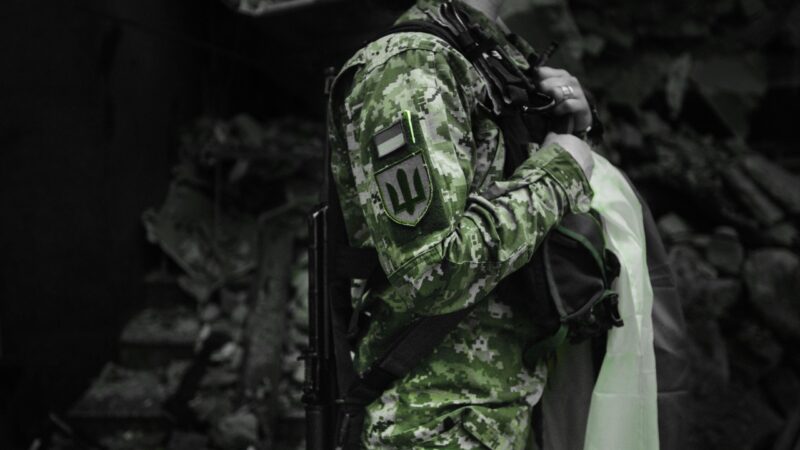
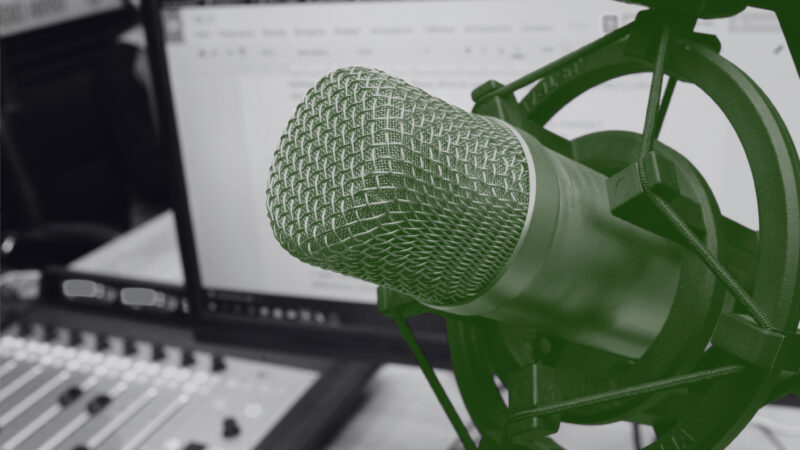

Some political experts wrongly call patriotic political forces in Ukraine, for example the Svoboda (Freedom) Party far right, ultranationalist, extremist and even neo-fascist and neo-Nazi.
Patriotic political forces in Ukraine are the staunchest defenders of Ukraine’s sovereignty and territorial integrity. They oppose Russia’s interference in Ukraine’s internal affairs, Russian domination of Ukraine, subjugation of Ukraine by Russia, and oppose Russification of Ukraine in terms of language, culture, religion, economy, business, etc.
Nowadays no political party in Ukraine supports fascist or Nazi ideology, or any other violent extremist ideology or policies. Some researchers and historians claim that Ukraine lost 8 million people in the Second World War (4 million military casualties and 4 million civilian casualties, and suffered colossal economic losses and material destruction).
The so-called right-wing political parties in Ukraine never get more than 4% of votes in the parliamentary elections which is much less than in EU countries, let alone in Russia.
All political parties in Russia profess neo-imperialist and extremist ideology, and try to implement it in practice (establishing a new Russian empire and subjugation of those nations that forcibly belonged to the Soviet Union in the past), in particular Ukraine, as the war by Russia against Ukraine since 2014 confirmed this truth. Like Nazi Germany, Putin’s Russia hates other nations and mistreats ethnic minorities such as the Chechens and other ones, wages enormous propaganda against them, falsifies history, interferes worldwide to get some benefit and to cause harm to other nations’ interests, wages wars to expand Russia to subjugate other nations, and to dominate the world as much as possible. Therefore, Putin’s regime in Russia closely resembles Hitler’s Nazi regime in its methods and policies, in particular in terms of enormous violations of human rights, abuse of power by officials, mistreating ordinary people in various ways, cruelty towards civilians and enormous crimes against them.
All political parties in Ukraine support the legitimate interests and rights of ethnic minorities according to the Constitution of Ukraine, and rightfully demand that ethnic minorities in Ukraine support Ukraine’s sovereignty and territorial integrity, and act in those interests.
Ethnic minorities in Ukraine do not suffer from any official discrimination or mistreatment. Russia and Poland, for example, treat the Ukrainian minority worse than Ukraine treats the Russian and Polish minority.
Just compare their opportunities to preserve and to practice their culture, language, religion, etc.
Keep in mind that most Russians living in Ukraine (citizens of Ukraine) do not support Ukraine’s sovereignty and territorial integrity, and support Russian domination over Ukraine, preservation of past Russification of Ukraine and further spread of Russification in Ukraine nowadays. Russians even demand the official status of the Russian language in Ukraine, forgetting that eastern and southern regions of Ukraine were heavily Russified by suppressing the Ukrainian language during tsarist and communist times by Russian imperialists.
Russian neo-imperialists obviously believe that through Russification of Ukraine they will dominate Ukraine, subjugate the Ukrainian nation, and that the Ukrainian nation will eventually cease to exist, and that they will expand Russia by making Ukraine a part of Russia. That’s why as well as out of frustration from growing ties between Ukraine and the European Union, Russia launched a criminal war of aggression against Ukraine in 2014.